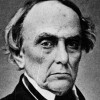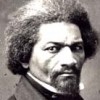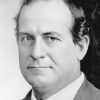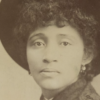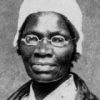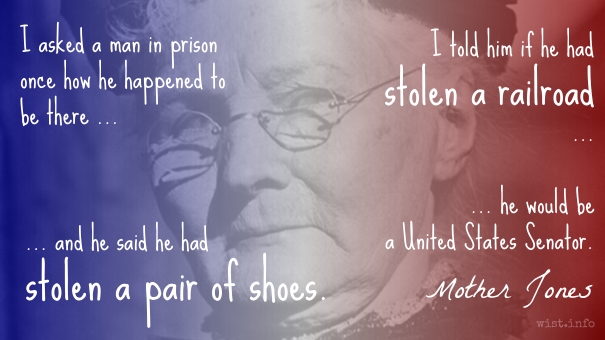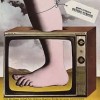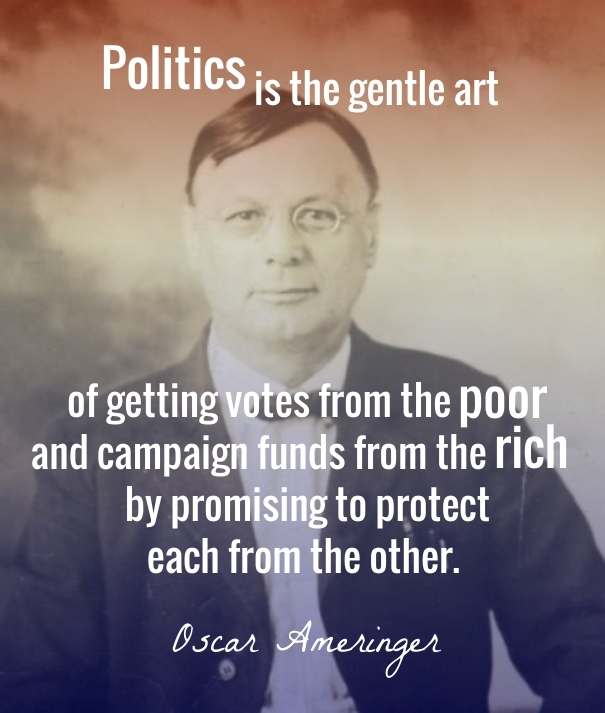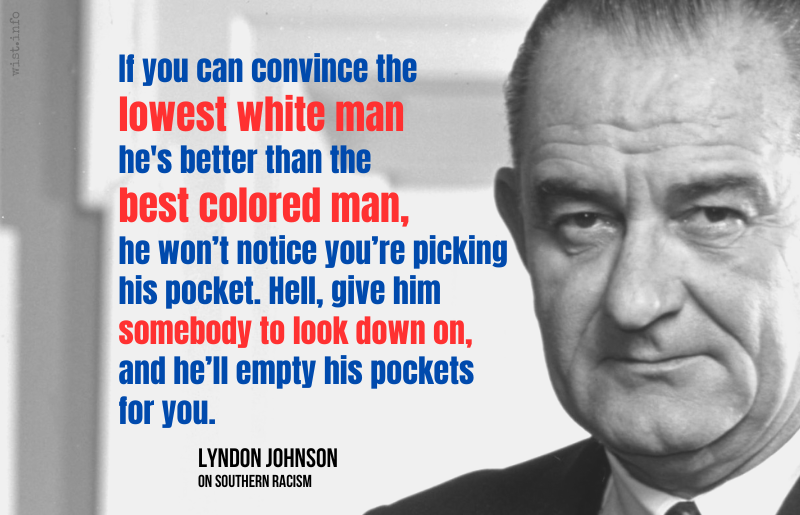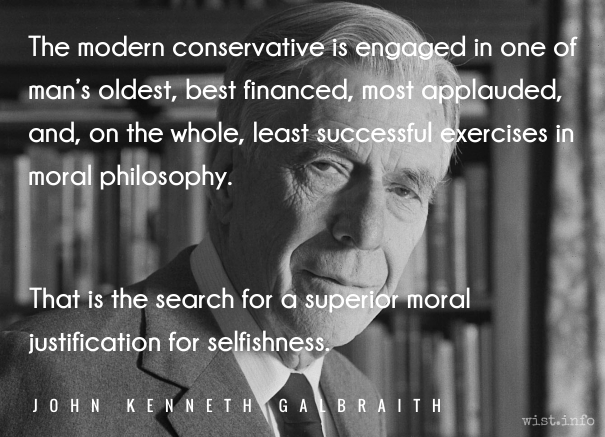In the nature of things, those who have not property, and see their neighbors possess much more than they think they need, cannot be favorable to laws made for the protection of property. When this class becomes numerous, it glows clamorous. It looks on property as its prey and plunder, and is naturally ready, at all times, for violence and revolution.
Daniel Webster (1782-1852) American statesman, lawyer, orator
Speech (1820-12-22), “First Settlement of New England,” Plymouth, Massachusetts
(Source)
On the bicentennial of the Pilgrims' landing in the New World.
Quotations about:
class warfare
Note not all quotations have been tagged, so Search may find additional quotes on this topic.
The American people have this lesson to learn: That where justice is denied, where poverty is enforced, where ignorance prevails, and where any one class is made to feel that society is an organized conspiracy to oppress, rob, and degrade them, neither persons nor property will be safe.
Frederick Douglass (1817-1895) American abolitionist, orator, writer
Speech (1886-04-16), “Strong to Suffer, and Yet Strong to Strive,” Israel Bethel Colored Methodist Episcopal Church, Washington, D.C.
(Source)
Will there be a future? We feel we might almost ask ourselves this question when we see so much terrible darkness. Grim confrontation between the selfish and the wretched. In the selfish, prejudices, the ignorance of a superior education, appetite fed by overindulgence, the insensitivity of an indurating prosperity, fear of suffering that in some extends to an aversion to those who suffer, relentless complacency, an ego so inflated it denies access to the soul. In the wretched, greed, envy, a hatred of seeing others enjoying themselves, the convulsions of the human beast within them seeking satisfaction, hearts befogged, sadness, need, fatalism, ignorance impure and simple.
[L’avenir arrivera-t-il? il semble qu’on peut presque se faire cette question quand on voit tant d’ombre terrible. Sombre face-à-face des égoïstes et des misérables. Chez les égoïstes, les préjugés, les ténèbres de l’éducation riche, l’appétit croissant par l’enivrement, un étourdissement de prospérité qui assourdit, la crainte de souffrir qui, dans quelques-uns, va jusqu’à l’aversion des souffrants, une satisfaction implacable, le moi si enflé qu’il ferme l’âme; chez les misérables, la convoitise, l’envie, la haine de voir les autres jouir, les profondes secousses de la bête humaine vers les assouvissements, les cœurs pleins de brume, la tristesse, le besoin, la fatalité, l’ignorance impure et simple.]
Victor Hugo (1802-1885) French writer
Les Misérables, Part 4 “St. Denis,” Book 7 “Argot,” ch. 4 (4.7.4) (1862) [tr. Donougher (2013)]
(Source)
(Source (French)). Alternate translations:Will the future come? It seems that we may almost ask this question when we see such terrible shadow. Sullen face-to-face of the selfish and the miserable. On the part of the selfish, prejudices, the darkness of the education of wealth, appetite increasing through intoxication, a stupefaction of prosperity which deafens, a dread of suffering which, with some, is carried even to aversion for sufferers, an implacable satisfaction, the me so puffed up that it closes the soul; on the part of the miserable, covetousness, envy, hatred of seeing others enjoy, the deep yearnings of the human animal towards the gratifications, hearts full of gloom, sadness, want, fatality, ignorance impure and simple.
[tr. Wilbour (1862)]Will the future arrive? it seems as we may almost ask this question on seeing so much terrible shadow. There is a somber, face-to-face meeting of the egotists and the wretched. In the egotist we trace prejudices, the cloudiness of a caste education, appetite growing with intoxication, and prosperity that stuns, a fear of suffering which in some goes so far as an aversion from the sufferers, an implacable satisfaction, and the feeling of self so swollen that it closes the soul. In the wretched we find covetousness, envy, the hatred of seeing others successful, the profound bounds of the human wild beast at satisfaction, and hearts full of mist, sorrow, want, fatality, and impure and simple ignorance.
[tr. Wraxall (1862)]Will the future arrive? It seems as though we might almost put this question, when we behold so much terrible darkness. Melancholy face-to-face encounter of selfish and wretched. On the part of the selfish, the prejudices, shadows of costly education, appetite increasing through intoxication, a giddiness of prosperity which dulls, a fear of suffering which, in some, goes as far as an aversion for the suffering, an implacable satisfaction, the I so swollen that it bars the soul; on the side of the wretched covetousness, envy, hatred of seeing others enjoy, the profound impulses of the human beast towards assuaging its desires, hearts full of mist, sadness, need, fatality, impure and simple ignorance.
[tr. Hapgood (1887)]Will the future ever arrive? The question seems almost justified when one considers the shadows looming ahead, the sombre confrontation of egoists and outcasts. On the side of the egoists, prejudice -- that darkness of a rich education -- appetite that grows with intoxication, the bemusement of prosperity which blunts the sense, the fear of suffering which in some cases goes so far as to hate all sufferers, and unshakeable complacency, the ego so inflated it stifles the soul; and on the side of the outcasts, greed and envy, resentment at the happiness of others, the turmoil of the human animal in search of personal fulfilment, hearts filled with fog, misery, needs, and fatalism, and simple, impure ignorance.
[tr. Denny (1976)]Will the future come? We can almost ask this question, it seems, when we see such terrible shadows. Sullen face-to-face encounter of the selfish and the miserable. On the side of the selfish, prejudices, the darkness of the education of wealth, appetite increasing through intoxication, a stultifying of prosperity, which deafens, a dread of suffering taken, for some, as far as an aversion to sufferers, an implacable satisfaction, the self so puffed up it closes the soul; on the side of the miserable, covetousness, envy, hatred of seeing others enjoy, the deep yearnings of the human animal toward gratification, hearts filled with gloom, sadness, want, inevitability, ignorance impure and simple.
[tr. Wilbour/Fahnestock/MacAfee (1987)]
Many speak the truth, when they say that they despise riches and preferment, but they mean the riches and preferment possessed by other men.
Charles Caleb "C. C." Colton (1780-1832) English cleric, writer, aphorist
Lacon: Or, Many Things in Few Words, Vol. 1, § 371 (1820)
(Source)
All historical changes finally boil down to the replacement of one ruling class by another. All talk about democracy, liberty, equality, fraternity, all revolutionary movements, all visions of Utopia, or ‘the classless society’, or ‘the Kingdom of Heaven on earth’, are humbug (not necessarily conscious humbug) covering the ambitions of some new class which is elbowing its way into power.
George Orwell (1903-1950) English journalist, essayist, writer [pseud. of Eric Arthur Blair]
Essay (1946-05), “Second Thoughts on James Burnham,” Polemic Magazine
(Source)
Summarizing Burnham's view of history as given in The Machiavellians (1942). Orwell does not agree with Burnham's thesis.
Published separately as a pamphlet, James Burnham and the Managerial Revolution (1946).
No people, least of all a democratic people, will be content to go without work or to accept some standard of living which obviously and woefully falls short of their capacity to produce. No people, least of all a people with our traditions of personal liberty, will endure the slow erosion of opportunity for the common man, the oppressive sense of helplessness under the domination of a few, which are overshadowing our whole economic life.
Franklin Delano Roosevelt (1882-1945) American lawyer, politician, statesman, US President (1933-1945)
Message (1938-04-29) to Congress, On Curbing Monopolies
(Source)
The human race is an unfair and stupid competition. A lot of the runners don’t even get decent sneakers or clean drinking water.
Some runners are born with a massive head start, every possible help along the way and still the referees seem to be on their side.
It’s not surprising a lot of people have given up competing altogether and gone to sit in the grandstand, eat junk food and shout abuse.
What we need in this race is a lot more streakers.Banksy (b. 1974?) England-based pseudonymous street artist, political activist, film director
Wall and Piece, “Rats” (2005)
(Source)
You wretches, detestable on land and sea; you who seek equality with lords are unworthy to live. Give this message to your colleagues: rustics you were and rustics you are still: you will remain in bondage, not as before but incomparably harsher. For as long as we live we will strive to suppress you, and your misery will be an example in the eyes of posterity. How ever, we will spare your lives if you remain faithful and loyal. Choose now which course you want to follow .
It is true, there has been among us a party for some years, consisting chiefly not of the descendants of the first settlers of this country but of high churchmen and high statesmen, imported since, who affect to censure this provision for the education of our youth as a needless expence, and an imposition upon the rich in favour of the poor — and as an institution productive of idleness and vain speculation among the people, whose time and attention it is said ought to be devoted to labour, and not to public affairs or to examination into the conduct of their superiours. And certain officers of the crown, and certain other missionaries of ignorance, foppery, servility and slavery, have been most inclined to countenance and increase the same party.
John Adams (1735-1826) American lawyer, Founding Father, statesman, US President (1797-1801)
Essay (1765-09-30), “A Dissertation on the Canon and the Feudal Law,” No. 3, Boston Gazette
(Source)
The man who steals a buckle is put to death, the man who steals a state becomes a prince.
[竊鉤者誅,竊國者侯 – traditional]
[窃钩者诛,窃国者侯 – simplified]Chuang Tzu (369-286 BC) Chinese Taoist philosopher [Zhuang Zhou (莊周), Zhuangzi ( 莊子)]
Zhuangzi (Chuang Tzŭ), ch. 10 “Quqie [胠篋; Rifling Trunks]” (3rd C BC) [tr. Graham (1981)]
(Source)
(Source (Chinese, traditional; simplified)). Alternate translations:One man steals a purse, and is punished. Another steals a State, and becomes a Prince.
[tr. Giles (1889)]Here is one who steals a hook (for his girdle); -- he is put to death for it: here is another who steals a state; -- he becomes its prince.
[tr. Legge (1891)]A poor man must swing
For stealing a belt buckle
But if a rich man steals a whole state
He is acclaimed
As statesman of the year.
[tr. Merton (1965)]This one steals a buckle and he is executed, that one steals a country and he becomes its ruler.
[tr. Palmer (1996)]He who steals a belt buckle pays with his life; he who steals a state gets to be a feudal lord.
[tr. Watson (2013)]One steals a hook -- he is put to death. Another steals a state -- he becomes a prince.
[tr. Yang/Höchsmann (2007)]He who steals a belt buckle is executed, but he who steals a state is made a feudal lord.
[tr. Ziporyn (2009)]
This adage can be found in a wide array of forms, with the same basic structure (steal something small, get punished; steal something big, get rewarded), usually stripped of its Chinese/Taoist origin, e.g.:Steal money you're a thief; steal a country you're a king.
["Japanese proverb"]Stealing a dog is said to be immoral. Still, they steal a country and call it righteousness.
[Source]To steal a purse is rightly held a crime.
To steal a country is an act sublime.
[Percy Russell (1919)]One who steals a pearl is persecuted as a thief. One who steals a nation is revered as a king.
[Source]When you steal a pin, you are executed; but if you steal a country, you become a king.
[Chinese historian Sima Qian (c. 145 – c. 86 BC)]One who steals a little is a thief. One who steals a little bit more is a robber. And one who steals a nation is a king.
[Source]To steal a fruit means theft, while to steal a country does not.
["Old Chinese saying"]Those that steal a loaf of bread are hanged as thieves - those that steal a country are made emperor.
[Source]Steal an apple and you're a thief. Steal a country and you're a statesman.
[Disney's Aladdin (2019)]
Etiquette systems of one kind or another govern all social intercourse, formal and informal, which is why faulty ones are able to do so much damage. A system that denies the innate human need for dignity to specific categories of people, typically the poor and the enslaved, fosters incendiary resentment.
Judith Martin (b. 1938) American author, journalist, etiquette expert [a.k.a. Miss Manners]
Star-Spangled Manners, ch. 1 (2003)
(Source)
A feeling very generally exists that the condition and disposition of the Working Classes is a rather ominous matter at present; that something ought to be said, something ought to be done, in regard to it. […] To us individually this matter appears, and has for many years appeared, to be the most ominous of all practical matters whatever; a matter in regard to which if something be not done, something will do itself one day, and in a fashion that will please nobody.
Thomas Carlyle (1795-1881) Scottish essayist and historian
Chartism, ch. 1 “Condition-of-England Question” (1840)
(Source)
The more I see of the moneyed classes, the more I understand the guillotine.
George Bernard Shaw (1856-1950) Irish playwright and critic
Letter (1899-09-25) to Edward Rose
(Source)
Written while on a six-week Mediterranean cruise.
The King’s cheese is half wasted in parings: But no matter, ’tis made of the peoples milk.
Benjamin Franklin (1706-1790) American statesman, scientist, philosopher, aphorist
Poor Richard (1735 ed.)
(Source)
We know that the poor are distressed by their many wants, and that nobody relieves them; but if the rich feel resentment, it is at lacking any single thing, or meeting with resistance from a single person.
[On sait que les pauvres sont chagrins de ce que tout leur manque, et que personne ne les soulage; mais s’il est vrai que les riches soient colères, c’est de ce que la moindre chose puisse leur manquer, ou que quelqu’un veuille leur résister.]
Jean de La Bruyère (1645-1696) French essayist, moralist
The Characters [Les Caractères], ch. 6 “Of Gifts of Fortune [Des Biens de Fortune],” § 48 (6.48) (1688) [tr. Stewart (1970)]
(Source)
(Source (French)). Alternate translations:The Poor are troubled that they want all things, and no body comforts them. The Rich are angry that they can want the least thing, or that any one would resist them.
[Bullord ed. (1696)]The Poor are troubled that they want every thing, and no body comforts them. The Rich are angry that they should want the least thing, or that any one should oppose them.
[Curll ed. (1713)]The Grief of the Poor is, that they want all Things, and no body comforts them. The Rich are angry if they want the least Thing, is any one contradict or oppose them.
[Browne ed. (1752)]It is well known that the poor are sad because they want everything and nobody comforts them; but if it be true that the rich are irascible, it is because they may want the smallest thing, or that some one might oppose them.
[tr. Van Laun (1885)]
This is that same Foulon named âme damnée du Parlement; a man grown gray in treachery, in griping, projecting, intriguing and iniquity: who once when it was objected, to some finance-scheme of his, “What will the people do?” — made answer, in the fire of discussion, “The people may eat grass”: hasty words, which fly abroad irrevocable, — and will send back tidings!
Thomas Carlyle (1795-1881) Scottish essayist and historian
The French Revolution: A History, Part 1, Book 3, ch. 9 (1.3.9) (1837)
(Source)
Writing of Joseph-François Foullon de Doué (1715-1789), French politician, the "damned soul of the Parliament," and a Controller-General of Finances under Louis XVI. Widely hated by "the people" for such statements and actions, he was one of the early targets of the French Revolution, as told in Dickens, A Tale of Two Cities. He was marched from his country hiding place back to Paris, with the mob shoving grass and hay into his face and mouth. He became the first recorded person to have been lynched from a lamp post. (The rope broke three times, so he was instead beheaded and his grass-stuffed head marched about on a pike.)
How far, O rich, do you extend your senseless avarice? Do you intend to be the sole inhabitants of the earth? Why do you drive out the fellow sharers of nature, and claim it all for yourselves? The earth was made for all, rich and poor, in common. Why do you rich claim it as your exclusive right? The soil was given to the rich and poor in common — wherefore, oh, ye rich, do you unjustly claim it for yourselves alone? Nature gave all things in common for the use of all; usurpation created private rights. Property hath no rights. The earth is the Lord’s, and we are his offspring. The pagans hold earth as property. They do blaspheme God.
Ambrose of Milan (339-397) Roman theologian, statesman, Christian prelate, saint, Doctor of the Church [Aurelius Ambrosius]
(Attributed)
Frequently quoted in the early 20th Century in various social justice writings, and in the years since then, but all citations I can find fall back to its inclusion in Upton Sinclair, The Cry for Justice, Book 8 "The Church" (1915) (though it can be found somewhat earlier than that).
And who can suffer injury by just taxation, impartial laws and the application of the Jeffersonian doctrine of equal rights to all and special privileges to none? Only those whose accumulations are stained with dishonesty and whose immoral methods have given them a distorted view of business, society and government. Accumulating by conscious frauds more money than they can use upon themselves, wisely distribute or safely leave to their children, these denounce as public enemies all who question their methods or throw a light upon their crimes.
William Jennings Bryan (1860–1925) American lawyer, statesman, politician, orator
Speech, Madison Square Garden, New York (1906-08-30)
(Source)
Every time you get a censor, you get a fool, and worse yet a knave, pretending to be a guardian of morality, while acting as a guardian of class greed.
Upton Sinclair (1878-1968) American writer, journalist, activist, politician
Money Writes!, ch. 22 “The Bookleggers” (1927)
(Source)
Self-quoted in "Poor Me and Pure Boston," The Nation (1927-06-29)
In short, the contradiction in the old defense of class stratification is that it defends leisure for the leisure class, but not for the underclass. With reference to the underclass, leisure is said to destroy the incentive to work, leads to slothfulness and self-indulgence, and retards cognitive and moral development. When applied to the leisure class, the concept evokes an image of Plato and Aristotle, whose leisure was based on slave labor, creating the intellectual foundations of Western civilization; or patrician slave-owners like Washington and Jefferson laying the foundations of American civilization; or creative aristocrats like Count Leo Tolstoy or Bertrand, Earl Russell; or, even closer to home, of our own sons and daughters (or of ourselves, when we were young adults) being freed from the stultifying tasks of earning a living until well into our adult years so that we could study in expensive universities to gain specialized knowledge and skills.
James Gilligan (b. c. 1936) American psychiatrist and author
Preventing Violence, ch. 5 (2001)
(Source)
We have laws, jails, courts, armies, guns and armories enough to make saints of us all, if they were the true preventives of crime; but we know they do not prevent crime; that wickedness and depravity exist in spite of them, nay, increase as the struggle between classes grows fiercer, wealth greater and more powerful and poverty more gaunt and desperate.
Lucy Parsons (1851-1942) American labor organizer, anarchist, orator [a.k.a. Lucy Gonzalez]
“The Principles of Anarchism,” lecture (1905)
(Source)
But if war continues to absorb and dominate it, or if the itch to rule the world requires large military establishment and appropriation, the freedom of democracy may one by one succumb to the discipline of arms and strife. If race or class war divides us into hostile camps, changing political argument into blind hate, one side or the other may overturn the hustings with the rule of the sword. If our economy of freedom fails to distribute wealth as ably as it has created it, the road to dictatorship will be open to any man who can persuasively promise security to all; and a martial government, under whatever charming phrases, will engulf the democratic world.
William James (Will) Durant (1885-1981) American historian, teacher, philosopher
The Lessons of History, ch. 10 (1968) [with Ariel Durant]
(Source)
THIRD FISHERMAN: Master, I marvel how the fishes live in the sea.
FIRST FISHERMAN: Why, as men do a-land: the great ones eat up the little ones.William Shakespeare (1564-1616) English dramatist and poet
Pericles, Act 2, sc. 1, l. 28ff (2.1.28-29) [with George Wilkins]
(Source)
I see now that English class consciousness has an important silver lining. At least there we know that class is a real fact of social life. Posh Brits are more likely to see that their position is at least in part the result of good fortune. For Americans to solve the problem of their deepening class divisions, we will have to start by admitting their existence and our complicity in maintaining them. We need to raise our consciousness about class. And yes, I am looking at you.
Richard V. Reeves (b. 1969) British historian, journalist, political theorist
“Stop Pretending You’re Not Rich,” New York Times (10 Jun 2017)
(Source)
Except for the field organizers of strikes, who were pretty tough monkeys and devoted, most of the so-called Communists I met were middle-class, middle-aged people playing a game of dreams. I remember a woman in easy circumstances saying to another even more affluent: “After the revolution even we will have more, won’t we, dear?” Then there was another lover of proletarians who used to raise hell with Sunday picnickers on her property.
I guess the trouble was that we didn’t have any self-admitted proletarians. Everyone was a temporarily embarrassed capitalist. Maybe the Communists so closely questioned by the investigation committees were a danger to America, but the ones I knew — at least they claimed to be Communists — couldn’t have disrupted a Sunday-school picnic. Besides they were too busy fighting among themselves.
John Steinbeck (1902-1968) American writer
Essay (1960-06-01), “A Primer on the Thirties,” Esquire
(Source)
Collected in Esquire: The Best of Forty Years (1973).
A portion of this was paraphrased in Ronald Wright, A Short History of Progress, ch. 5 "The Rebellion of the Tools" (2004):John Steinbeck once said that socialism never took root in America because the poor see themselves not as an exploited proletariat but as temporarily embarrassed millionaires.
That paraphrase has, in turn, been frequently given as a direct quotation of Steinbeck.
Once more, let me remind you what fascism is. It need not wear a brown shirt, or a green shirt — it may even wear a dress shirt. Fascism begins the moment a ruling class, fearing the people may use their political democracy to gain economic democracy, begins to destroy political democracy in order to retain its power of exploitation and special privilege.
Where some possess much, and the others nothing, there may arise an extreme democracy, or a pure oligarchy; or a tyranny may grow out of either extreme.
Aristotle (384-322 BC) Greek philosopher
Politics [Πολιτικά], Book 4, ch. 11 / 1296a.1-3 [tr. Jowett (1885)]
(Source)
Alternate translations:
- "When some possess too much, and others nothing at all, the government must either be in the hands of the meanest rabble or else a pure oligarchy; or, from the excesses of both, a tyranny." [tr. Ellis (1912)]
- "Where some own a very great deal of property and others none there comes about either an extreme democracy or an unmixed oligarchy, or a tyranny may result from both of the two extremes." [tr. Rackham (1932)]
- "Where some possess very many things and others nothing, either rule of the people in its extreme form must come into being, or unmixed oligarchy, or -- as a result of both of these excesses -- tyranny." [tr. Reeve (2007)]
- "Where some people are very wealthy and others have nothing, the result will be either extreme democracy or absolute oligarchy, or despotism will come from either of those excesses."
There can be no permanent disfranchised peasantry in the United States. Freedom can never yield its fullness of blessings so long as the law or its administration places the smallest obstacle in the pathway of any virtuous citizen.
James A. Garfield (1831-1881) US President (1881), lawyer, lay preacher, educator
Inaugural address (4 Mar 1881)
(Source)
I do not see in religion the mystery of the incarnation, but the mystery of the social order; religion attaches to heaven an idea of equality that stops the rich from being massacred by the poor.
[Quant à moi, je ne vois pas dans la religion le mystère de l’incarnation, mais le mystère de l’ordre social; elle rattache au ciel une idée d’égalité qui empêche que le riche ne soit massacré par le pauvre.]
Napoleon Bonaparte (1769-1821) French emperor, military leader
Statement (4 Mar 1806)
(Source)
Quoted in Opinions de Napoléon sur divers sujets de politique et d'administration, recueillies par un membre de son conseil d'état (1833).
You have oppressed the poor and robbed them of their grain. And so you will not live in the fine stone houses you build or drink wine from the beautiful vineyards you plant. I know how terrible your sins are and how many crimes you have committed. You persecute good people, take bribes, and prevent the poor from getting justice in the courts. And so, keeping quiet in such evil times is the smart thing to do! Make it your aim to do what is right, not what is evil, so that you may live. Then the Lord God Almighty really will be with you, as you claim he is.
The Bible (The Old Testament) (14th - 2nd C BC) Judeo-Christian sacred scripture [Tanakh, Hebrew Bible], incl. the Apocrypha (Deuterocanonicals)
Amos 5:11-14 [GNT (1976)]
(Source)
Alternate translations:Forasmuch therefore as your treading is upon the poor, and ye take from him burdens of wheat: ye have built houses of hewn stone, but ye shall not dwell in them; ye have planted pleasant vineyards, but ye shall not drink wine of them. For I know your manifold transgressions and your mighty sins: they afflict the just, they take a bribe, and they turn aside the poor in the gate from their right. Therefore the prudent shall keep silence in that time; for it is an evil time. Seek good, and not evil, that ye may live: and so the Lord, the God of hosts, shall be with you, as ye have spoken.
[KJV (1611)]Well then, since you have trampled on the poor man, extorting levies on his wheat -- those houses you have built of dressed stone, you will never live in them; and those precious vineyards you have planted, you will never drink their wine. For I know that your crimes are many, and your sins enormous: persecutors of the virtuous, blackmailers, turning away the needy at the city gate. No wonder the prudent man keeps silent, the times are so evil. Seek good and not evil so that you may live, and that Yahweh, God of Sabaoth, may really be with you as you claim he is.
[JB (1966)]Therefore because you trample on the poor and take from them levies of grain, you have built houses of hewn stone, but you shall not live in them; you have planted pleasant vineyards, but you shall not drink their wine. For I know how many are your transgressions, and how great are your sins -- you who afflict the righteous, who take a bribe, and push aside the needy in the gate. Therefore the prudent will keep silent in such a time; for it is an evil time. Seek good and not evil, that you may live; and so the Lord, the God of hosts, will be with you, just as you have said.
[NRSV (1989 ed.)]Assuredly,
Because you impose a tax on the poor
And exact from them a levy of grain,
You have built houses of hewn stone,
But you shall not live in them;
You have planted delightful vineyards,
But shall not drink their wine.
For I have noted how many are your crimes,
And how countless your sins --
You enemies of the righteous,
You takers of bribes,
You who subvert in the gate
The cause of the needy!
Assuredly,
At such a time the prudent keep silent,
For it is an evil time.
Seek good and not evil,
That you may live,
And that the ETERNAL, the God of Hosts,
May truly be with you,
As you think.
[RJPS (2006)]
How long will you judge unjustly
and show partiality to the wicked? Selah
Give justice to the weak and the orphan;
maintain the right of the lowly and the destitute.
Rescue the weak and the needy;
deliver them from the hand of the wicked.The Bible (The Old Testament) (14th - 2nd C BC) Judeo-Christian sacred scripture [Tanakh, Hebrew Bible], incl. the Apocrypha (Deuterocanonicals)
Psalm 82: 2-4 [NRSV (2021 ed.)]
(Source)
Alternate translations:How long will ye judge unjustly, and accept the persons of the wicked? Selah.
Defend the poor and fatherless: do justice to the afflicted and needy.
Deliver the poor and needy: rid them out of the hand of the wicked.
[KJV (1611)]No more mockery of justice,
no more favouring the wicked! Pause
Let the weak and the orphan have justice,
be fair to the wretched and destitute;
rescue the weak and needy,
save them from the clutches of the wicked!
[JB (1966)]You must stop judging unjustly;
you must no longer be partial to the wicked!
Defend the rights of the poor and the orphans;
be fair to the needy and the helpless.
Rescue them from the power of evil people.
[GNT (1976)]How much longer will you give unjust judgements and uphold the prestige of the wicked? Pause
Let the weak and the orphan have justice, be fair to the wretched and the destitute.
Rescue the weak and the needy, save them from the clutches of the wicked.
[NJB (1985)]How long will you judge unjustly
by granting favor to the wicked? Selah
Give justice to the lowly and the orphan;
maintain the right of the poor and the destitute!
Rescue the lowly and the needy.
Deliver them from the power of the wicked!
[CEB (2011)]How long will you judge perversely,
showing favor to the wicked? Selah.
Judge the wretched and the orphan,
vindicate the lowly and the poor,
rescue the wretched and the needy;
save them from the hand of the wicked.
[RJPS (2023 ed.)]
So long as there shall exist, by virtue of law and custom, decrees of damnation pronounced by society, artificially creating hells amid the civilization of earth, and adding the element of human fate to divine destiny; so long as the three great problems of the century — the degradation of man through pauperism, the corruption of woman through hunger, the crippling of children through lack of light — are unsolved; so long as social asphyxia is possible in any part of the world; — in other words, and with a still wider significance, so long as ignorance and poverty exist on earth, books of the nature of Les Misérables cannot fail to be of use.
[Tant qu’il existera, par le fait des lois et des mœurs, une damnation sociale créant artificiellement, en pleine civilisation, des enfers, et compliquant d’une fatalité humaine la destinée qui est divine; tant que les trois problèmes du siècle, la dégradation de l’homme par le prolétariat, la déchéance de la femme par la faim, l’atrophie de l’enfant par la nuit, ne seront pas résolus; tant que, dans de certaines régions, l’asphyxie sociale sera possible; en d’autres termes, et à un point de vue plus étendu encore, tant qu’il y aura sur la terre ignorance et misère, des livres de la nature de celui-ci pourront ne pas être inutiles.]
Victor Hugo (1802-1885) French writer
Les Misérables, Preface (1862) [tr. Hapgood (1887)]
(Source)
(Source (French)). Alternate translations:So long as there shall exist, by reason of law and custom, a social condemnation, which, in the face of civilization, artificially creates hells on earth, and complicates a destiny that is divine, with human fatality; so long as the three problems of the age -- the degradation of man by poverty, the ruin of woman by starvation, and the dwarfing of childhood by physical and spiritual night -- are not solved; so long as, in certain regions, social asphyxia shall be possible ; in other words, and from a yet more extended point of view, so long as ignorance and misery remain on earth, books like this cannot be useless.
[tr. Wilbour (1862)]As long as there shall exist, as a consequence of laws and customs, a social damnation artificially creating hells in the midst of civilization, and complicating the destiny which is divine with a fatality which is human; as long as the three problems of the age -- the degradation of man by the proletariat, the ruin of woman by hunger, the atrophy of the child by the night—are not solved; as long as in certain regions social asphyxia shall be possible; in other terms, and from a still more extended point of view, as long as there shall be on the earth ignorance and wretchedness, books of the nature of this one cannot be useless.
[tr. Wraxall (1862)]While through the working of laws and customs there continues to exist a condition of social condemnation which artificially creates a human hell within civilization, and complicates with human fatality a destiny that is divine; while the three great problems of this century, the degradation of man in the proletariat, the subjection of women through hunger, the atrophy of the child by darkness, continue unresolved; while in some regions social asphyxia remains possible; in other words, and in still wider terms, while ignorance and poverty persist on earth, books such as this cannot fail to be of value.
[tr. Denny (1976)]So long as there shall exist, by reason of law and custom, a social condemnation which, in the midst of civilization, artificially creates a hell on earth, and complicates with human fatality a destiny that is divine; so long as the three problems of the century -- the degradation of man by the exploitation of his labor, the ruin of woman by starvation, and the atrophy of childhood by physical and spiritual night -- are not solved; so long as, in certain regions, social asphyxia shall be possible; in other words, and, from a still broader point of view, so long as ignorance and misery remain on earth, there should be a need for books such as this.
[tr. Wilbour/Fahnestock/MacAfee (1987)]As long as through the workings of laws and customs there exists a. damnation-by-society artificially creating hells int he very midst of civilization and complicating destiny, which is divine, with a man-made fate; as long as the three problems of the age are not resolved: the debasement of of men through proletarianization, the moral degradation of women through hunger, and the blighting of children by keeping them in darkness; as long as in certain strata social suffocation is possible; in other words and from an even broader perspective, as long as there are ignorance and poverty on earth, books of this kind may serve some purpose.
[tr. Donougher (2013)]
“I hope that you did not give him anything, Mr Sanderson!”
“Of course I did, ma’am.”
“But he would only spend it on drink! You know what the working classes are!”
“Indeed, ma’am, and why should he not spend it on drink? Would you deprive the poor, whose lives are bad and miserable and comfortless enough, of the solace of a little relief from grinding poverty? A sordid, sodden relief perhaps, but would you be so heartless as to deny the poor even that pleasure in which all of us indulge at your generous expense?”
When I put a question to him about socialism in agriculture, he explained with glee how he had incited the poorer peasants against the richer ones, “and they soon hanged them from the nearest tree — ha! ha! ha!” His guffaw at the thought of those massacred made my blood run cold.
The English, of all ranks and classes, are at bottom, in all their feelings, aristocrats. They have some concept of liberty, & set some value on it, but the very idea of equality is strange & offensive to them. They do not dislike to have many people above them as long as they have some below them.
John Stuart Mill (1806-1873) English philosopher and economist
Letter to Giussepe Mazzini (15 Apr 1858)
(Source)
We repudiate all morality which proceeds from supernatural ideas or ideas which are outside the class conception. In our opinion, morality is entirely subordinate to the interests of the class war; everything is moral which is necessary for the annihilation of the old exploiting social order and for uniting the proletariat. Our morality consists solely in close discipline and conscious warfare against the exploiters.
Vladimir Ilich Lenin (1870-1924) Russian politician, revolutionary, political theorist [b. Vladimir Ilich Ulyamov]
(Attributed)
(Source)
Quoted in René Fülöp-Miller, Lenin and Gandhi (1927).
The urge to distribute wealth equally, and still more the belief that it can be brought about by political action, is the most dangerous of all popular emotions. It is the legitimation of envy, of all the deadly sins the one which a stable society based on consensus should fear the most. The monster state is a source of many evils; but it is, above all, an engine of envy.
What has destroyed every previous civilization has been the tendency to the unequal distribution of wealth and power. This same tendency, operating with increasing force, is observable in our civilization to-day, showing itself in every progressive community, and with greater intensity the more progressive the community. Wages and interest tend constantly to fall, rent to rise, the rich to become very much richer, the poor to become more helpless and hopeless, and the middle class to be swept away.
You cannot bring about prosperity by discouraging thrift.
You cannot help small men by tearing down big men.
You cannot strengthen the weak by weakening the strong.
You cannot lift the wage earner by pulling down the wage payer.
You cannot help the poor man by destroying the rich.
You cannot keep out of trouble by spending more than your income.
You cannot further the brotherhood of man by inciting class hatred.
You cannot establish security on borrowed money.
You cannot build character and courage by taking away men’s initiative and independence.
You cannot help men permanently by doing for them what they could and should do for themselves.William J. H. Boetcker (1873-1962) German-American religious leader, author, public speaker [William John Henry Boetcker]
“The Industrial Decalogue” (1916)
Often referred to as "The Ten Cannots," and also often misattributed to Abraham Lincoln.
When the rich rob the poor it’s called business. When the poor fight back it’s called violence.
Mark Twain (1835-1910) American writer [pseud. of Samuel Clemens]
(Spurious)
Frequently, but incorrectly attributed to Twain, no earlier than 2015. It appears to have been an anonymous phrase coined in the Occupy Movement in 2011. See here for more information.
I asked a man in prison once how he happened to be there and he said he had stolen a pair of shoes. I told him if he had stolen a railroad he would be a United States Senator.
KING ARTHUR: Shut up!
DENNIS: Oh, now we see the violence inherent in the system. Come and see the violence inherent in the system! Help! Help! I’m being repressed!
KING ARTHUR: Bloody peasant!
DENNIS: Oh, what a giveaway! Did you hear that? Did you hear that, eh? That’s what I’m on about! Did you see him repressing me? You saw him, didn’t you?
We have this fantasy that our interests and the interests of the super-rich are the same, like somehow the rich will eventually get so full that they’ll explode, and the candy will rain down on the rest of us, like there’s some sort of piñata of benevolence. But here’s the thing about a piñata: it doesn’t open on its own. You have to beat it with a stick.
The doctor asserted, “Sure religion is a fine influence — got to have it to keep the lower classes in order — fact, it’s the only thing that appeals to a lot of these fellows and makes ’em respect the rights of property. And I guess this theology is O.K.; lot of wise old coots figured it out, and they knew more about it than we do.” He believed in the Christian religion, and never thought about it; he believed in the church, and seldom went near it; he was shocked by Carol’s lack of faith, and wasn’t quite sure what was the nature of the faith that she lacked.
Public services have, to use the economist’s word, a strong redistributional effect. And this effect is strongly in favor of those with lower incomes. Those who clamor the loudest for public economy are those for whom public services do the least. Tax reduction that curtails or limits public services has a double effect in comforting the comfortable and afflicting the poor.
Despite considerable propaganda to the contrary, the greatest need of the moment is not a decision to be tender to the well-to-do. Their situation is not so desperate as popularly represented. Also one makes an economy work not by rewarding the rich but by rewarding all who contribute to its success.
John Kenneth Galbraith (1908-2006) Canadian-American economist, diplomat, author
Speech (1963-12-13), “Wealth and Poverty,” National Policy Committee on Pockets of Poverty
(Source)
Everything is un-American that tends either to government by a plutocracy, or government by a mob. To divide along the lines of section or caste or creed is un-American. All privilege based on wealth, and all enmity to honest men merely because they are wealthy, are un-American — both of them equally so. Americanism means the virtues of courage, honor, justice, truth, sincerity, and hardihood — the virtues that made America. The things that will destroy America are prosperity-at-any-price, peace-at-any-price, safety-first instead of duty-first, the love of soft living, and the get-rich-quick theory of life.
THE BASTARD: Well, whiles I am a beggar, I will rail
And say there is no sin but to be rich;
And being rich, my virtue then shall be
To say there is no vice, but beggary.William Shakespeare (1564-1616) English dramatist and poet
King John, Act 2, sc. 1, l. 621ff (2.1.621-624) (1596)
(Source)
If you can convince the lowest white man he’s better than the best colored man, he won’t notice you’re picking his pocket. Hell, give him somebody to look down on, and he’ll empty his pockets for you.
Lyndon B. Johnson (1908-1973) American politician, educator, US President (1963-69)
Comment (1960)
(Source)
Discussing racist graffiti in Tennessee, seen earlier in the day. Recalled in Bill Moyers, "What a Real President Was Like," Washington Post (1988-11-13).
More discussion here: Did Lyndon B. Johnson Say This About The 'Lowest White Man' and 'Best Colored Man'? | Snopes.com.
“At this festive season of the year, Mr. Scrooge,” said the gentleman, taking up a pen, “it is more than usually desirable that we should make some slight provision for the Poor and Destitute, who suffer greatly at the present time. Many thousands are in want of common necessaries; hundreds of thousands are in want of common comforts, sir.”
“Are there no prisons?” asked Scrooge.
“Plenty of prisons,” said the gentleman, laying down the pen again.
“And the Union workhouses?” demanded Scrooge. “Are they still in operation?”
“They are. Still,” returned the gentleman, “I wish I could say they were not.”
“The Treadmill and the Poor Law are in full vigour, then?” said Scrooge.
“Both very busy, sir.”
“Oh! I was afraid, from what you said at first, that something had occurred to stop them in their useful course,” said Scrooge. “I’m very glad to hear it.”
“Under the impression that they scarcely furnish Christian cheer of mind or body to the multitude,” returned the gentleman, “a few of us are endeavouring to raise a fund to buy the Poor some meat and drink and means of warmth. We choose this time, because it is a time, of all others, when Want is keenly felt, and Abundance rejoices. What shall I put you down for?”
“Nothing!” Scrooge replied.
“You wish to be anonymous?”
“I wish to be left alone,” said Scrooge. “Since you ask me what I wish, gentlemen, that is my answer. I don’t make merry myself at Christmas and I can’t afford to make idle people merry. I help to support the establishments I have mentioned — they cost enough; and those who are badly off must go there.”
“Many can’t go there; and many would rather die.”
“If they would rather die,” said Scrooge, “they had better do it, and decrease the surplus population. Besides — excuse me — I don’t know that.”
“But you might know it,” observed the gentleman.
“It’s not my business,” Scrooge returned. “It’s enough for a man to understand his own business, and not to interfere with other people’s. Mine occupies me constantly. Good afternoon, gentlemen!”
Charles Dickens (1812-1870) English writer and social critic
A Christmas Carol, Stave 1 “Marley’s Ghost” (1843)
(Source)
In each great revolutionary struggle the masses are led on by vague dreams of human brotherhood, and then, when the new ruling class is well established in power, they are thrust back into servitude. This is practically the whole of political history, as Burnham sees it. […] History consists of a series of swindles, in which the masses are first lured into revolt by the promise of Utopia, and then, when they have done their job, enslaved over again by the new masters.
George Orwell (1903-1950) English journalist, essayist, writer [pseud. of Eric Arthur Blair]
Essay (1946-05), “Second Thoughts on James Burnham,” Polemic Magazine
(Source)
Summarizing Burnham's view of history as given in The Managerial Revolution (1940) and The Machiavellians (1942). Orwell does not agree with Burnham's thesis.
Published separately as a pamphlet, James Burnham and the Managerial Revolution (1946).
Woe to those who make unjust laws,
to those who issue oppressive decrees,
to deprive the poor of their rights
and withhold justice from the oppressed of my people,
making widows their prey
and robbing the fatherless.
What will you do on the day of reckoning,
when disaster comes from afar?
To whom will you run for help?
Where will you leave your riches?
Nothing will remain but to cringe among the captives
or fall among the slain.The Bible (The Old Testament) (14th - 2nd C BC) Judeo-Christian sacred scripture [Tanakh, Hebrew Bible], incl. the Apocrypha (Deuterocanonicals)
Isaiah 10: 1-3 [NIV (2011 ed.)]
(Source)
Alternate translations:Woe unto them that decree unrighteous decrees, and that write grievousness which they have prescribed; To turn aside the needy from judgment, and to take away the right from the poor of my people, that widows may be their prey, and that they may rob the fatherless! And what will ye do in the day of visitation, and in the desolation which shall come from far? to whom will ye flee for help? and where will ye leave your glory? Without me they shall bow down under the prisoners, and they shall fall under the slain.
[KJV (1611)]You are doomed! You make unjust laws that oppress my people. That is how you keep the poor from having their rights and from getting justice. That is how you take the property that belongs to widows and orphans. What will you do when God punishes you? What will you do when he brings disaster on you from a distant country? Where will you run to find help? Where will you hide your wealth? You will be killed in battle or dragged off as prisoners.
[GNT (1976)]Woe to those who enact unjust decrees, who compose oppressive legislation to deny justice to the weak and to cheat the humblest of my people of fair judgement, to make widows their prey and to rob the orphan. What will you do on the day of punishment, when disaster comes from far away? To whom will you run for help and where will you leave your riches, to avoid squatting among the captives or falling among the slain?
[NJB (1985)]Ha! Those who write out evil writs and compose iniquitous documents, to subvert the cause of the poor, to rob of their rights the needy of My people; that widows may be their spoil, and fatherless children their booty! What will you do on the day of punishment, When the calamity comes from afar? To whom will you flee for help, And how will you save your carcasses from collapsing under [fellow] prisoners, from falling beneath the slain?
[JPS (1985)]Woe to those who make iniquitous decrees, who write oppressive statutes, to turn aside the needy from justice and to rob the poor of my people of their right, to make widows their spoil and to plunder orphans! What will you do on the day of punishment, in the calamity that will come from far away? To whom will you flee for help, and where will you leave your wealth, so as not to crouch among the prisoners or fall among the slain?
[NRSV (1989 ed.)]
There is something wrong in a government where they who do the most have the least. There is something wrong when honesty wears a rag, and rascality a robe; when the loving, the tender, eat a crust, while the infamous sit at banquets.
Robert Green Ingersoll (1833-1899) American lawyer, freethinker, orator
Speech (1886-11-14), “A Lay Sermon,” American Secular Union annual congress, Chickering Hall, New York City
(Source)
The modern conservative is not even especially modern. He is engaged, on the contrary, in one of man’s oldest, best financed, most applauded, and, on the whole, least successful exercises in moral philosophy. That is the search for a superior moral justification for selfishness. It is an exercise which always involves a certain number of internal contradictions and even a few absurdities. The conspicuously wealthy turn up urging the character-building value of privation for the poor. The man who has struck it rich in minerals, oil, or other bounties of nature is found explaining the debilitating effect of unearned income from the state. The corporate executive who is a superlative success as an organization man weighs in on the evils of bureaucracy. Federal aid to education is feared by those who live in suburbs that could easily forgo this danger, and by people whose children are in public schools. Socialized medicine is condemned by men emerging from Walter Reed Hospital. Social Security is viewed with alarm by those who have the comfortable cushion of an inherited income. Those who are immediately threatened by public efforts to meet their needs — whether widows, small farmers, hospitalized veterans, or the unemployed — are almost always oblivious to the danger.
John Kenneth Galbraith (1908-2006) Canadian-American economist, diplomat, author
Speech (1963-12-13), “Wealth and Poverty,” National Policy Committee on Pockets of Poverty
(Source)
Galbraith used variations on this quote over the years.
- The above quotation was from a speech given, that was then entered into the Congressional Record, Vol. 109, Senate (1963-12-18).
- This material was reworked into an article "Let us begin: An invitation to action on poverty," in Harper's (1964-03), which was in turn again entered into the Congressional Record, Vol. 110 (1964).
- One of the last is most often cited: "The modern conservative is engaged in one of man’s oldest exercises in moral philosophy, that is the search for a superior moral justification for selfishness. It is an exercise which always involves a certain number of internal contradictions and even a few absurdities. The conspicuously wealthy turn up urging the character-building value of privation for the poor." ["Stop the Madness," Interview with Rupert Cornwell, Toronto Globe and Mail (2002-07-06)]
In the final result, it mattered not one whit whether the movement was in favor of one class or of another. The outcome was equally fatal, whether the country fell into the hands of a wealthy oligarchy which exploited the poor or whether it fell under the domination of a turbulent mob which plundered the rich. In both cases there resulted violent alternations between tyranny and disorder, and a final complete loss of liberty to all citizens — destruction in the end overtaking the class which had for the moment been victorious as well as that which had momentarily been defeated. The death-knell of the Republic had rung as soon as the active power became lodged in the hands of those who sought, not to do justice to all citizens, rich and poor alike, but to stand for one special class and for its interests as opposed to the interests of others.
Theodore Roosevelt (1858-1919) American politician, statesman, conservationist, writer, US President (1901-1909)
Speech (1903-09-07), “The Square Deal,” Labor Day, New York State Agricultural Association, New York State Fair, Syracuse
(Source)
On the fate of historic republics.
It is all-essential to the continuance of our healthy national life that we should recognize this community of interest among our people. The welfare of each of us is dependent fundamentally upon the welfare of all of us, and therefore in public life that man is the best representative of each of us who seeks to do good to each by doing good to all; in other words, whose endeavor it is not to represent any special class and promote merely that class’s selfish interests, but to represent all true and honest men of all sections and all classes and to work for their interests by working for our common country.
Theodore Roosevelt (1858-1919) American politician, statesman, conservationist, writer, US President (1901-1909)
Speech (1903-09-07), “The Square Deal,” Labor Day, New York State Agricultural Association, New York State Fair, Syracuse
(Source)
The royalists of the economic order have conceded that political freedom was the business of the government, but they have maintained that economic slavery was nobody’s business. They granted that the government could protect the citizen in his right to vote, but they denied that the government could do anything to protect the citizen in his right to work and his right to live.
Today we stand committed to the proposition that freedom is no half-and-half affair. If the average citizen is guaranteed equal opportunity in the polling place, he must have equal opportunity in the market place.Franklin Delano Roosevelt (1882-1945) American lawyer, politician, statesman, US President (1933-1945)
Speech (1936-06-27), Acceptance, Renomination for President, Democratic National Convention, Philadelphia
(Source)
(Source (Audio): 7:08)
These economic royalists complain that we seek to overthrow the institutions of America. What they really complain of is that we seek to take away their power. Our allegiance to American institutions requires the overthrow of this kind of power. In vain they seek to hide behind the flag and the Constitution. In their blindness they forget what the flag and the Constitution stand for. Now, as always, they stand for democracy, not tyranny; for freedom, not subjection; and against a dictatorship by mob rule and the over-privileged alike.
Franklin Delano Roosevelt (1882-1945) American lawyer, politician, statesman, US President (1933-1945)
Speech (1936-06-27), Acceptance, Renomination for President, Democratic National Convention, Philadelphia
(Source)
(Source (Audio)). The above is the official version of the speech. At the podium, the last section, starting with "Now, as always," was said by Roosevelt as:Now, as always, for over a century and a half, the flag and the Constitution stand against a dictatorship by mob rule and the over-privileged alike, and the flag and the Constitution stand for democracy, not tyranny; for freedom, not subjection.
If we are to keep our democracy, there must be one commandment: Thou shalt not ration justice.
Learned Hand (1872-1961) American jurist
Speech, Legal Aid Society of New York (1951-02-16)
(Source)
On ensuring that accused persons did not lack for counsel needed for a fair trial.
DISTANCE, n. The only thing that the rich are willing for the poor to call theirs, and keep.
Ambrose Bierce (1842-1914?) American writer and journalist
“Distance,” The Cynic’s Word Book (1906)
(Source)
Included in The Devil's Dictionary (1911). Originally published in the "Devil's Dictionary" column in the San Francisco Wasp (1882-04-02).

